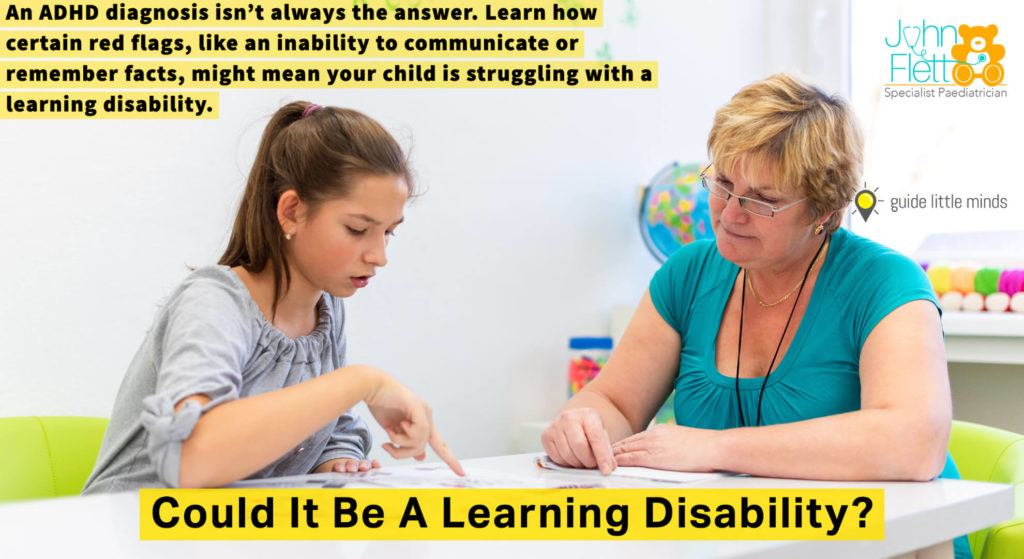Could It Be A Learning Disability?

An ADHD diagnosis isn’t always the answer. Learn how certain red flags, like an inability to communicate or remember facts, might mean your child is struggling with a learning disability.
Between 30 and 50 per cent of those with ADHD also have a learning disability. The reverse is also true. As a result, it is wise for parents with a child with ADHD to have them evaluated for a learning disability.
Red Flags to Look For
The earlier you suspect your child may have a learning disability, like dyslexia (a reading disability), dysgraphia (a writing disability), or dyscalculia (a math learning disability), the sooner you can get help. Here are some weaknesses to watch for.
In preschool, look for:
- Communication problems include slow language development, difficulty with speech, and problems understanding what is being said or communicating thoughts.
- Poor motor coordination and uneven motor development include delays in learning to walk, colour, and use scissors.
- Problems with memory, routine, and multiple instructions.
- Delays in socialisation, including interacting with other children.
In early elementary school, look for:
- Problems with rapid letter recognition and with recognising familiar words by sight. Difficulties are learning phonemes (units of sound) and sounding out words.
- Problems forming letters and numbers. Later, problems with basic spelling and grammar.
- Difficulties are learning math skills and doing math calculations.
- Difficulty remembering facts.
- Difficulty organising materials (notebook, papers), information, and concepts. Losing or forgetting material, doing work and forgetting to turn it in.
- Not understanding oral instructions. Difficulty expressing oneself.
In later elementary school, look for:
- Difficulty with independent reading and retaining what was read.
- Difficulty organising thoughts for written work.
- Difficulty learning new math concepts and successfully applying them.
- Increased difficulty organising school and personal materials.
In middle school, look for:
- Increased difficulty retaining what was read, organising and writing papers, and mastering more advanced math concepts.
- Increased difficulty with organising, planning, and developing learning strategies.
In high school, look for:
- Increased difficulty with reading assignments, papers and math.
- Increased difficulty with organisation, as more independent work is expected.
Now What?
If your child has some or all of these difficulties, discuss your concerns with teachers. Request an evaluation.
If the results confirm an LD, go back to your school and ask that your concerns be addressed.
Once your child is found to have a learning disability, it’s essential to get help, whether in re-mediating the problems or developing compensatory strategies. Accommodations in the classroom may also be needed. Teachers often chalk up a child’s difficulties to ADHD, not a learning disability. Now you know the difference and can help your child succeed.
Know What’s Expected
A learning disability manifests itself in various ways. Familiarising yourself with the goals of each grade level will help you recognise whether your child is meeting them.
- Preschool: In addition to socialisation skills, children begin to improve motor skills (colouring, cutting, drawing) and language skills (discussions, stories, play).
- Kindergarten: A child should develop rapid letter recognition, many sound/letter associations, early number concepts, and the rudiments of writing. Difficulties in these areas may point to early signs of dyslexia or dyscalculia.
- First and second grades: A child learns to read by blending sounds with letters and sounding out words. They learn to form letters and are taught capitalisation and early punctuation. They learn basic math concepts and should master addition and subtraction.
- Third and fourth grades: The focus shifts from developing skills to using them. Spelling, grammar, and punctuation skills are further developed. Math skills expand to include multiplication and division. The student learns to express himself verbally.
- Fifth grade/middle school: The focus shifts to using skills to learn content-history, science. Reading assignments become longer and more complex. Writing assignments require the ability to conceptualise and organise thoughts. Basic math skills lead to more complex math concepts. Organising papers has become essential.
- High school: The focus is on content. It is assumed that the student can read and use what was read, take notes, organise, and write short and long papers. Math becomes still more complex. Verbal comprehension (during lectures) and expression is essential. The need to independently organise materials, keep track of assignments, and complete tasks in a timely way is essential.
Dr Flett can conduct a complete Paediatric assessment to assess all aspects of your child both at home and at school. Contact 031 1000 474. support@courses.drflett.com Join us on Facebook https://www.facebook.com/drjohnflett
